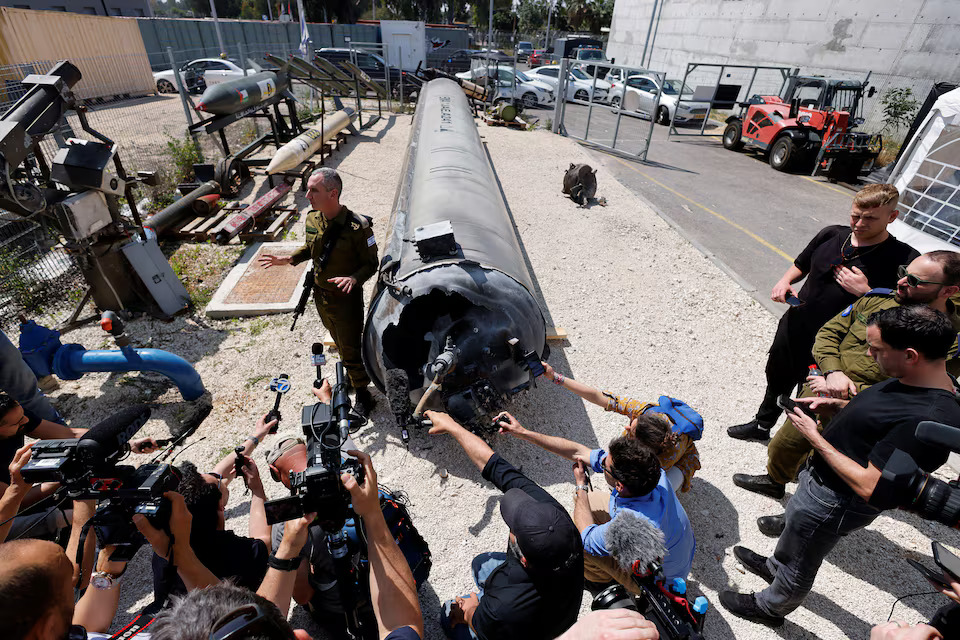Iranian President Ebrahim Raisi warned Israel that it would face a "real and extensive" response if it makes any "mistake" following Tehran’s missile and drone offensive on April 14.
"If any mistake is made, the Zionists and their supporters will discover Iran's real and extensive answer," the president said at a meeting with Deputy Speaker of Lebanese Supreme Shia Council Ali Al-Khatib, on April 16, IRNA news agency reported.
Raisi said that Iran's response to the April 1 airstrike on its consulate in Damascus was strictly a "punitive measure". He added that the recent events proved the "legitimacy" of Iran's uncompromising stance on the Palestinian cause and the efficacy of its "resistance" against Israel.
He said the hatred for the West, the US and Israel, and "unity" among Islamic countries worldwide, had reached "unprecedented" levels in the wake of the Gaza war.
Israel Defense Forces Chief of Staff Herzi Halevi recently stated that Iran's attack through more than 300 missiles, cruise missiles and drones "will be met with a response", but gave no details.
Israeli Army Spokesman Rear Admiral Daniel Hagari said 99% of Iran’s missiles, suicide drones and cruise missiles were intercepted outside of Israel's borders, in a joint effort by Israel, the US, the UK and Jordan.
The US and its allies planned fresh sanctions against Iran over its attack on Israel, seeking to dissuade Israel from a major escalation as its war cabinet was set to meet for a third time on April 17 to decide a response.
After Iran’s overnight operation, Iranian Foreign Minister Hossein Amir-Abdollahian warned that US bases in the wider Middle East would be struck if they facilitated Israeli attacks on his country.
On April 15, in a phone conversation with his British counterpart, David Cameron, amid heightened tension with Israel, Amir-Abdollahian criticised the UK for backing Israel, and asked in what way the British government benefited from such "irresponsible support".
"While several thousand tonnes of bombs have been dropped on the oppressed people of Gaza in the past six months, it is surprising that the UK is worried about Iran's response to the brutal attack by the Israeli regime against (its) diplomatic mission," the Iranian minister argued.
Amir-Abdollahian threatened that "our next response would be immediate, stronger and more extensive" if Israel sought to act against Tehran, and added that Israel had a wrong impression as Iran had previously shown restraint.
In turn, Cameron expressed concern over the potential escalations, saying that Britain would also urge Israel not to take any actions that would further intensify the tensions.
In a phone conversation with Amir-Abdollahian, Indian Foreign Minister Subrahmanyam Jaishankar asked Iran to cooperate regarding the 17 Indian crew members of a Portugal-flagged ship in the Strait of Hormuz, MSC Aries, seized by Islamic Revolutionary Guards Corps (IRGC) on April 13, which Iran says is linked to Israel. In response, the Iranian minister promised to facilitate their meeting with the Indian representatives shortly.
While the Iranian attack caused no deaths and little damage thanks to the air defences and countermeasures of Israel and its allies, it heightened fears that the six-month-old Gaza war is spreading, with the risk of open war between the long-time adversaries Iran and Israel.







 Azerbaijan’s historical biographical film “Taghiyev” has won the Best Feature Film award at the Dehancer Colorist Awards 2024. The film, which chro...
Azerbaijan’s historical biographical film “Taghiyev” has won the Best Feature Film award at the Dehancer Colorist Awards 2024. The film, which chro...
 Azerbaijan has been recognized as one of the safest countries in the world, ranking 90th among 163 countries on the Global Terrorism Index 2025 (GTI).
Azerbaijan has been recognized as one of the safest countries in the world, ranking 90th among 163 countries on the Global Terrorism Index 2025 (GTI).
 The Azerbaijani Defense Ministry has reported ongoing shelling of its army positions by Armenian forces since last week.
The Azerbaijani Defense Ministry has reported ongoing shelling of its army positions by Armenian forces since last week.
 Nine years have passed since a bloody escalation of the Armenia-Azerbaijan conflict that was later dubbed the April War or Four Day War.
Nine years have passed since a bloody escalation of the Armenia-Azerbaijan conflict that was later dubbed the April War or Four Day War.
 Azerbaijanis around the world are commemorating March 31 as the Day of Genocide of Azerbaijanis, which took place 107 years ago and is considered o...
Azerbaijanis around the world are commemorating March 31 as the Day of Genocide of Azerbaijanis, which took place 107 years ago and is considered o...



